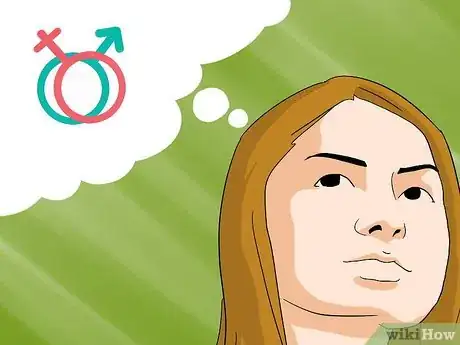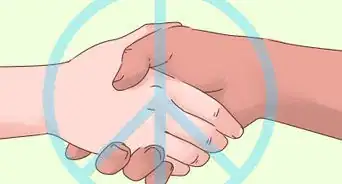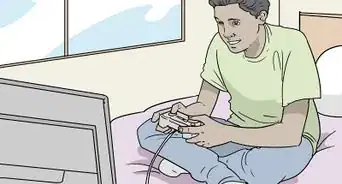This article was co-authored by Deb Schneider, LCSW, PPSC. Deb Schneider is a Licensed Clinical Social Worker in private practice in Oakland, CA, and a Program Manager for the Weiland Health Initiative at Stanford University. With over 15 years of experience, she specializes in creating safe spaces, respectful of marginalized identities, at the high school and college levels. Deb holds a Bachelor’s degree in Sociology and Women's Studies from Clark University and a Master of Social Work (MSW) with Health Concentration from the University of California, Berkeley School of Social Welfare.
This article has been viewed 106,792 times.
A person who identifies as pansexual is someone who can be emotionally, romantically, and/or sexually attracted to anyone despite their gender identity.[1] This sexual orientation differs from bisexuality in that it includes the prefix pan, or all.[2] Bisexuality, on the other hand, includes the prefix bi, or two.[3] Therefore, pansexuality includes all gender identities and sexual orientations. It represents people who can be attracted to anyone. Learning to ask or find out from someone about their sexual orientation can be a tricky thing as you can appear to be invasive, or even ignorant if you use the wrong words or methods. Make sure you're well educated on what sexual orientation is before submerging yourself into a conversation about it, especially with someone you don't know very well. However, the more you discuss it with close, well-educated friends, the more you can begin to understand sexual orientation and even explore your own. Finding out if someone is pansexual can be done pretty swiftly and smoothly if you know how to ask and where to look in regard to their sexual orientation.
Steps
-
1Understand that the best first step to knowing someone's sexual orientation is to ask them. This is true when you want to know anyone's sexual orientation, not just if they are pansexual. But also understand how many times particular individuals have probably had to tell others about their sexual orientation. Respect that they may not want to tell you and understand that it's perfectly okay for them not to want to share it with you. Don't assume that they are or are not pansexual based on them rejecting your request to tell you their orientation. There are plenty of other sexual orientations that they could identify as. Assumptions are never a solution.
-
2Make sure you ask respectfully and avoid slurs that can be considered rude. This includes abbreviations such as pan. You should always use the full word "pansexual" when asking about orientation. The same rules apply when asking someone about any orientation. Bi, homo, and other abbreviations can appear offensive and should be avoided. Jokes are never okay. Puns off of the double meaning in "pan" are quite common and offensive. Ask politely - Your sense of humor is never appreciated when it is used to make fun of another person's sexual orientation or the way they were born.Advertisement
-
3Understand that not everyone chooses to label their sexual orientation. As a label may make someone's sexual orientation easier for others to understand, some people see their orientation as a much more fluid subject. Therefore, if someone chooses not to label themselves as pansexual despite having been involved with men, women, and genderqueer people, you shouldn't go out of your way to consider them pansexual. Respect their identity or lack thereof.
-
4If you're not in the position to ask someone about their orientation, look at their past relationships if at all possible. See the variety of genders of people they've dated in the past and make an educated judgment. Keep step three in mind, however. Although an educated guess is okay, don't begin calling someone pansexual simply because you believe they are based on their pasts.
-
5Consider prior knowledge about someone to be a gateway to ask them about whether or not they are pansexual. If you know someone has dated someone that you know to be transgender or genderqueer, then you may be in the position to ask them about their orientation. For example, "I heard you were in a relationship with xyz. I was curious, and I hope you don't mind me asking, but are you pansexual?" or, "Feel free not to answer if this is personal, but what is your sexual orientation?" However, be careful when doing something like this and know how to read the conversation. If said without true, factual prior knowledge about someone, your asking could appear to be a quickly designed assumption and read to be very aggressive and offensive.
Community Q&A
-
QuestionI am still in high school and have never been in a relationship before, but for now I don't mind dating a person of any gender. Could my feelings be real?
 Community AnswerYour feelings are real, because you are really having them. Maybe the way you identify will change, for some people it does, maybe it will remain the same. It doesn't matter as long as you are happy.
Community AnswerYour feelings are real, because you are really having them. Maybe the way you identify will change, for some people it does, maybe it will remain the same. It doesn't matter as long as you are happy. -
QuestionCan kids be pansexual?
 Luna RoseTop AnswererChildren usually figure out their orientations around ages 9-12, so if the child is around this age, they probably know what they are talking about. Give the child plenty of support, and possibly a library book that explains different orientations in a factual, accepting way. Don't worry about it too much; everything is pretty innocent during childhood, and with love and support, the child will figure things out.
Luna RoseTop AnswererChildren usually figure out their orientations around ages 9-12, so if the child is around this age, they probably know what they are talking about. Give the child plenty of support, and possibly a library book that explains different orientations in a factual, accepting way. Don't worry about it too much; everything is pretty innocent during childhood, and with love and support, the child will figure things out. -
QuestionI think I am pansexual because I could love someone (emotionally, not physically) because of their personality, not their gender or appearance. I have loved anyone but the opposite sex, so I'm not very sure, also I'm just 12.
 Community AnswerIt depends in what sense you mean 'love'. A person of any sexual orientation can love people in a friendly or familial way, regardless of their gender. To be pansexual, your sexual or romantic feelings toward people have to be unrelated to their gender. If you could see yourself in a romantic relationship with people of any gender, maybe you are pansexual. But it's perfectly okay if you're not sure yet. You're very young. It can take many more years than this to really figure these things out.
Community AnswerIt depends in what sense you mean 'love'. A person of any sexual orientation can love people in a friendly or familial way, regardless of their gender. To be pansexual, your sexual or romantic feelings toward people have to be unrelated to their gender. If you could see yourself in a romantic relationship with people of any gender, maybe you are pansexual. But it's perfectly okay if you're not sure yet. You're very young. It can take many more years than this to really figure these things out.
References
- ↑ https://www.health.com/sex/what-is-pansexual
- ↑ https://www.dictionary.com/browse/pan-
- ↑ https://www.dictionary.com/browse/bi-
- ↑ https://www.urbandictionary.com/define.php?term=panromantic
- https://www.psychologytoday.com/us/blog/sex-sexuality-and-romance/201711/the-truth-about-pansexuality
- https://www.umass.edu/stonewall/sites/default/files/documents/allyship_term_handout.pdf







-Step-14-Version-2.webp)
-Step-16.webp)




















-Step-14-Version-2.webp)
-Step-16.webp)


































